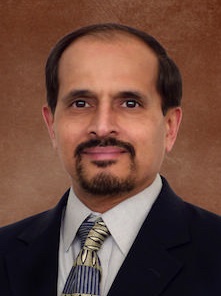
Bal Lokeshwar
J. Harold Harrison, MD Dist Univ Chair in Basic Sc

Bal Lokeshwar
J. Harold Harrison, MD Dist Univ Chair in Basic Sc
Professor
Academic Appointment(s)
Medical College of Georgia
Department of Medicine: Hematology and Oncology
Medical College of Georgia
Department of Georgia Cancer Center
Medical College of Georgia
Department of Urology
Medical College of Georgia
Department of Surgery
Medical College of Georgia
Department of Biochemistry and Molecular Biology
Administration
Department of The Graduate School
Bio
Ph.D. 1984 from the Indian Institute of Science, Bengaluru, India, Post-Doc: Washington University, St.Louis, MO. University of Miami Faculty (1989-2015). Cancer biologist and translational medicine.
- BLOKESHWAR@augusta.edu
- (706) 723-0033
- (706) 721-0101
- CN 3317
- Personal Website
Education
-
Ph.D., Biology/Biological Sciences, General Indian Institute of Science, 1984
-
BS, Biology/Biological Sciences, General Birla Institute of Technology, 1979
Awards & Honors
-
Distinguished Basic Science Teaching award MCG Faculty Senate, 2021
Courses Taught Most Recent Academic Year
-
BIOM 8215
Fundamentals of Oncology I
Teaching Interests
Diet and cancer prevention, Fundamentals of cancer biology, Inflammation and cancer. Cancer metastasis. Problem Based Learning.
Scholarship
Selected Recent Publications
- A Novel Splice Variant of HYAL-4 Drives Malignant Transformation and Predicts Outcome in Patients with Bladder Cancer, 2020
Journal Article, Academic Journal - Atypical chemokine receptors in tumor cell growth and metastasis., 2020
Journal Article, Academic Journal - Withania somnifera root extract inhibits fatty acid synthesis in prostate cancer cells., 2020
Other - β-Arrestins Regulate Stem cell-like Phenotype and Response to Chemotherapy in Bladder Cancer., 2019
Journal Article, Academic Journal
Research Interests
I am a cancer biologist. As a U.S. Army Medical Research Programs and NIH-funded investigator for the last thirty years, my principal area of research has been prostate, bladder, and breast cancers and, chronic benign diseases such as Occular Rosacea and Benign Prostatic Hyperplasia and Fibrosis. Categorically, my subspecialities of research has been developing novel therapeutics for prevention and control of cancer progression, metastasis, use of natural and semisynthetic natural products for disease prevention and treatment. As a fundamental researcher in biomedical field, my research group was the first to identify the imbalance between the endogenous levels of matrix metalloproteinases and their inhibitors in prostate cancer metastasis. My investigation helped to develop a new class of antitumor agents, chemically modified non-antimicrobial tetracycline compounds (e.g., CMT-3/COL-3) against several cancers and for ocular rosacea. My research findings on the role of pro-inflammatory proteins (COX-2, IL-8, and osteopontin) that are elevated in tumors led me to define several histochemical markers that independently predict biochemical progression of prostate cancer, recurrence, and metastasis. My work on the role of CXC-Chemokines that have pleiotropic functions in cancer progression and response to therapy have elucidated the potential role of scaffold proteins (e.g., beta-arrestins) in cancer progression and response to treatment. My research focus for the last ten years has been to develop dietary chemo preventive and therapeutic use of plant-derived–anticancer compounds that serve the dual role of dietary enhancement and as cancer preventive agents. These include an Amazonian dietary supplement BIRM and Allspice (Pimenta dioica). I have identified novel antitumor compounds such as Ericifolin and plant-derived glycosaminoglycans from medicinal plants and the role of Ursolic Acid and other phytochemicals as potential treatment against bladder, prostate and breast cancers. My other contribution includes understanding the mechanisms of CXC-chemokines, their receptors and signaling intermediates and their interaction with protein tyrosine kinase receptors that promote cell growth and differentiation. I have extensive experience in working with animal models of breast, prostate, and bladder cancers. I have worked with collaborators at Augusta University for the last ten year on developing and testing novel anticancer compounds on breast, bladder, and prostate cancers. I am a team player and had many fruitful collaborations both within my academic institute and outside.
University Service
-
Graduate Students Selection Committee (RAC) 2020
Role: Committee Member
-
Senate Faculty Award Committee 2020
Role: Committee Member